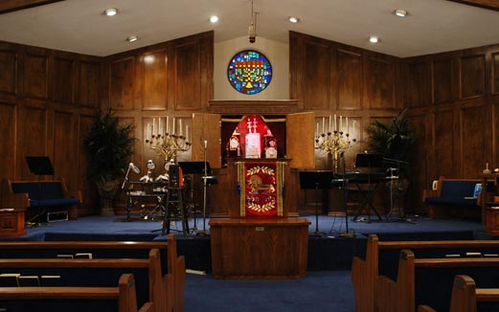
Shabbat Services
Friday: Erev Shabbat Service - 8:00pm
Saturday: Shabbat Service - 11:00am
Saturday: Shabbat Service - 11:00am
In our services, we combine traditional Jewish liturgy with a mix of Scripturally-based, contemporary Jewish music that helps lead people into an enhanced worship experience. You will see physical forms of worship such as clapping (Psalm 47:1) and lifting our hands in surrender to Adonai (Psalm 63:5) which are all a part of good old-fashioned Jewish celebrative praise (Psalm 150).
You will notice that a portion of our service is done in Hebrew. This is the language of our people, and the original written language of the Tanakh (Old Testament). If you are new to a Messianic Shabbat service, no worries! You don’t have to be a Hebrew scholar to worship with us. However, if you listen carefully, you will find that almost everything in Hebrew is immediately repeated in English, or provided in a translated form in our siddurim (prayer books). Our service leaders explain most everything that we do, so that our visitors can understand and comfortably take part in the many traditions throughout our services.
A custom you may already be familiar with is that many men wear a tallit (a fringed prayer shawl). The Biblical reference for “fringes” is found in B’midbar (Numbers) 15:37-41, where Adonai uses it as a focal point to remind His people to obey Him and not to follow their own impulses which could lead them astray. It also represents G-d’s desire to have the royal thread of His presence interwoven throughout every fiber of our lives.
Although there is no biblical reference to today’s kippa or yarmulke (skullcap) worn by Jewish men, there are references to head coverings worn by the Cohanim (Levitical Priesthood). Traditionally though, the kippa represents one's deep desire to humbly submit to the headship of Adonai. It has been a symbol of Jewish identity for the past several hundred years and serves as an outward sign of respect for the house of G-d. Attendees are not obligated to wear a tallit or a kippa; however, we do have some in the lobby that visiting men can wear during the service.
After the liturgy, music, and the Torah reading (a special time when we read an assigned portion from the Torah, the Haftorah and the B’rit Chadasha-New Covenant), our Rabbi will teach on the Scriptures and how it applies to our lives. These relevant messages are incredibly insightful, personally challenging and clearly communicated, with a purpose to strengthen personal relationships with the G-d of Abraham, Isaac and Jacob.
We have fantastic and fun-filled classes for our yeladim (children) during our Shabbat services, too.
Nursery (ages 0–3 years) – Friday and Saturday services
Entire service. Every parent is assigned a code and can be silently notified during the service if he/she is needed.
Torah Tots (ages 4–6 years) – Saturday services only
Children participate in the main service until they are dismissed to their class.
The Saturday-only Shabbat class is for children ages 4-6 years old. The children will grow in their understanding of G-d from an age-appropriate and well-rounded Messianic Jewish curriculum. The class includes prayer, learning the alef-bet letters and sounds, a Bible story, a movement activity, a craft and worship. Come grow in G-d’s Word with us!
Kids Congregation (ages 4–8 years) – Friday services only
Children participate in the main service until they are dismissed to their class.
This Friday-only Shabbat class is for children ages 4-8 years old. The children will grow in their understanding of G-d from an age-appropriate and well-rounded Messianic Jewish curriculum. The class includes prayer, learning the alef-bet letters and sounds, a Bible story, a movement activity, a craft and worship. Come grow in G-d’s Word with us!
Club Maccabee (ages 7–9 years) – Saturday services only
Children participate in the main service until they are dismissed to their class. This Saturday-only Shabbat class is for children ages 7-9 years old. We do not meet on the 1st Shabbat of each month (Torah Walk) or if there is a Bar/Bat Mitzvah. During class, your child participates in the following: recites Hatikvah (Israel’s national anthem), prays, practices Hebrew, learns about Jewish history and traditions, has an interactive Scripture study and plays games. Come join the club!
For more information about our Children's Education Department
You will notice that a portion of our service is done in Hebrew. This is the language of our people, and the original written language of the Tanakh (Old Testament). If you are new to a Messianic Shabbat service, no worries! You don’t have to be a Hebrew scholar to worship with us. However, if you listen carefully, you will find that almost everything in Hebrew is immediately repeated in English, or provided in a translated form in our siddurim (prayer books). Our service leaders explain most everything that we do, so that our visitors can understand and comfortably take part in the many traditions throughout our services.
A custom you may already be familiar with is that many men wear a tallit (a fringed prayer shawl). The Biblical reference for “fringes” is found in B’midbar (Numbers) 15:37-41, where Adonai uses it as a focal point to remind His people to obey Him and not to follow their own impulses which could lead them astray. It also represents G-d’s desire to have the royal thread of His presence interwoven throughout every fiber of our lives.
Although there is no biblical reference to today’s kippa or yarmulke (skullcap) worn by Jewish men, there are references to head coverings worn by the Cohanim (Levitical Priesthood). Traditionally though, the kippa represents one's deep desire to humbly submit to the headship of Adonai. It has been a symbol of Jewish identity for the past several hundred years and serves as an outward sign of respect for the house of G-d. Attendees are not obligated to wear a tallit or a kippa; however, we do have some in the lobby that visiting men can wear during the service.
After the liturgy, music, and the Torah reading (a special time when we read an assigned portion from the Torah, the Haftorah and the B’rit Chadasha-New Covenant), our Rabbi will teach on the Scriptures and how it applies to our lives. These relevant messages are incredibly insightful, personally challenging and clearly communicated, with a purpose to strengthen personal relationships with the G-d of Abraham, Isaac and Jacob.
We have fantastic and fun-filled classes for our yeladim (children) during our Shabbat services, too.
Nursery (ages 0–3 years) – Friday and Saturday services
Entire service. Every parent is assigned a code and can be silently notified during the service if he/she is needed.
Torah Tots (ages 4–6 years) – Saturday services only
Children participate in the main service until they are dismissed to their class.
The Saturday-only Shabbat class is for children ages 4-6 years old. The children will grow in their understanding of G-d from an age-appropriate and well-rounded Messianic Jewish curriculum. The class includes prayer, learning the alef-bet letters and sounds, a Bible story, a movement activity, a craft and worship. Come grow in G-d’s Word with us!
Kids Congregation (ages 4–8 years) – Friday services only
Children participate in the main service until they are dismissed to their class.
This Friday-only Shabbat class is for children ages 4-8 years old. The children will grow in their understanding of G-d from an age-appropriate and well-rounded Messianic Jewish curriculum. The class includes prayer, learning the alef-bet letters and sounds, a Bible story, a movement activity, a craft and worship. Come grow in G-d’s Word with us!
Club Maccabee (ages 7–9 years) – Saturday services only
Children participate in the main service until they are dismissed to their class. This Saturday-only Shabbat class is for children ages 7-9 years old. We do not meet on the 1st Shabbat of each month (Torah Walk) or if there is a Bar/Bat Mitzvah. During class, your child participates in the following: recites Hatikvah (Israel’s national anthem), prays, practices Hebrew, learns about Jewish history and traditions, has an interactive Scripture study and plays games. Come join the club!
For more information about our Children's Education Department
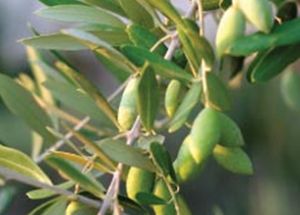
Tu B'Shevat
Sunday, February 1 - Monday, February 2
Tu B’Shevat means the 15th of the month called Shevat. It is the new year for trees, specifically, the way to keep track of the ages of trees based on Leviticus 19:23-25, which explains that the people could not eat the fruit of a tree until it was in its fifth year. The actual holiday is not mandated in Scripture, but we enjoy the traditions associated with it. Some customs for Tu B’Shevat are to eat a new fruit, to eat one of the Seven Species (crops that are abundant in Israel according to Scripture), to plant a tree or to send money to Israel to help plant trees.
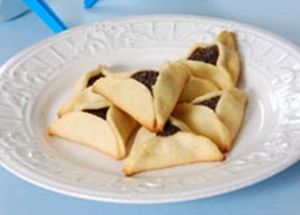
Purim
Monday, March 2 - Tuesday, March 3
Purim Service – Monday, March 2 at 7:00 pm
Purim Party - Sunday, March 1 at 2:00 pm
Purim Service – Monday, March 2 at 7:00 pm
Purim Party - Sunday, March 1 at 2:00 pm
Purim means “lots” and is the holiday when we remember Esther and her story during a time in Jewish history when “lots” were cast to select a day to destroy the Jewish people. G-d protected His people from their enemies through the faithfulness of Mordecai and his cousin Hadassah (Esther), so we give thanks during this festival each year. In Esther 9:22, we read that we are to celebrate by “feasting and rejoicing and sending portions of food to one another and gifts to the poor” so we do just that. We also eat plenty of hamantashen (triangular shaped cookies filled with sweet jam) to remind us of Haman’s defeat and retell the accounts of the book of Esther accompanied by blotting out Haman’s name with booing and groggers (noisemakers). We are also continually thankful for His promise to Abraham to protect the Jewish people that we read in Genesis 12:3 that says, “I will bless those who bless you, and whoever curses you I will curse; and all peoples on earth will be blessed through you.”
We celebrate each year with a big party! Come in costume and get ready to have a lot of fun as we recount the story of Purim and how G-d saved us then and saves us now.
We celebrate each year with a big party! Come in costume and get ready to have a lot of fun as we recount the story of Purim and how G-d saved us then and saves us now.
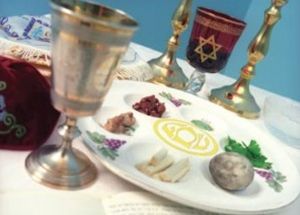
Passover (Pesach) & Chag HaMatzah
Thursday, April 2 - Thursday, April9
Beth Hallel Passover Seder - Saturday, April 4 at 4:00 pm
Children's Chocolate Seder - Sunday, April 5 at 3:45 pm
Beth Hallel Passover Seder - Saturday, April 4 at 4:00 pm
Children's Chocolate Seder - Sunday, April 5 at 3:45 pm
Pesach (Passover) literally means “to pass over” something and refers to G-d’s promise to pass over every household that had the blood of the sacrificial lamb on its doorpost on the night that He killed all the firstborn in Egypt. (Exodus 12:13) He then delivered the Israelites from slavery in Egypt altogether through the obedience of Moses. Pesach is followed by Chag HaMatzah (the Feast of Unleavened Bread), which lasts for seven days as seen in Leviticus 23:5-8. Based on Exodus 12, we remove all leavening from our houses in remembrance of the fact that the Israelites had to move quickly during their escape and did not have time to wait for bread to rise. We also have a traditional seder meal during which we eat certain symbolic foods in a specific order, as “seder” means “order.” The Passover story is one of redemption and is extremely meaningful from a Messianic perspective, as we remove leaven (sin) from our homes and put our hope in Yeshua the Messiah, the sacrificial lamb, who became our Pesach and has delivered us.
Each year, Beth Hallel hosts a large Passover Seder. Tickets typically go on sale around six weeks or so before the event. Contact the office for more information.
Each year, Beth Hallel hosts a large Passover Seder. Tickets typically go on sale around six weeks or so before the event. Contact the office for more information.

Resurrection Day
Service - Sunday, April 5 at 4:00pm
The Messiah provided final atonement for sin by sacrificing His unblemished life and conquering death by His resurrection. This is a day to celebrate indeed! Yeshua observed Pesach at a seder with His closest followers before being betrayed. He laid down His life and then was in the grave for 3 days. Then, He arose, just as prophesied.
We will celebrate the Messiah’s resurrection with a joyful service. Let’s be sure to celebrate the fact that Yeshua the Messiah is alive!
We will celebrate the Messiah’s resurrection with a joyful service. Let’s be sure to celebrate the fact that Yeshua the Messiah is alive!
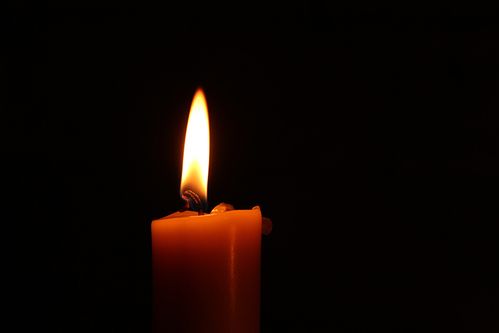
Yom HaShoah - Holocaust Remembrance Day
Monday, April 13 - Tuesday, April 14
Service - Tuesday, April 14 at 7:00 pm
Service - Tuesday, April 14 at 7:00 pm
We Remember
Although not a holiday, Congregation Beth Hallel regularly commemorates the loss of over 6 million Jewish lives during the Holocaust. We recognize Yom HaShoah every year through a variety of remembrances including guest speakers, plays and exhibits. In the past, Congregation Beth Hallel has hosted former members of the Knesset from Israel, Holocaust survivors, special musical guests from around the world, and a theater company to pay tribute to the memories of those lost. As a community, we stand strong in the support of Israel and the entire community of Jewish people around the world.
Although not a holiday, Congregation Beth Hallel regularly commemorates the loss of over 6 million Jewish lives during the Holocaust. We recognize Yom HaShoah every year through a variety of remembrances including guest speakers, plays and exhibits. In the past, Congregation Beth Hallel has hosted former members of the Knesset from Israel, Holocaust survivors, special musical guests from around the world, and a theater company to pay tribute to the memories of those lost. As a community, we stand strong in the support of Israel and the entire community of Jewish people around the world.
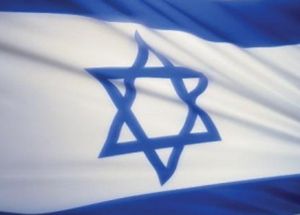
Yom Ha'Atzmaut - Israeli Independence Day
Tuesday, April 21 - Wednesday, April 22
Celebration - Saturday, April 25 at 1:15 pm
Celebration - Saturday, April 25 at 1:15 pm
This is the Israeli Independence Day (the 5th of Iyar on the Hebrew calendar) when we remember the miracle of May 14, 1948, when David Ben Gurion read the Proclamation of the establishment of the State of Israel, officially ending the British Mandate. It is a joyful celebration of G-d’s faithfulness to His people.
Join us as we celebrate this modern day biblical miracle! We throw a big party and rejoice together. This is something worth celebrating!
Join us as we celebrate this modern day biblical miracle! We throw a big party and rejoice together. This is something worth celebrating!
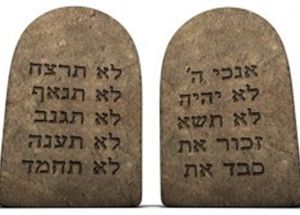
Shavuot
Thursday, May 21 - Friday, May 22
Service - Thursday, May 21 at 7:00 pm
Service - Thursday, May 21 at 7:00 pm
Shavuot (weeks) is a holiday that comes seven weeks after Pesach (described in Leviticus 23:15-21 and Deuteronomy 16:10). Some non-Jewish people call it Pentecost (fiftieth) because it occurs 50 days after Pesach. In Leviticus, the holiday is referred to as Bikkurim (first fruits) because it actually is when the latter first fruits were offered to G- d. This is one of the three mandatory feasts that Jewish men were to travel to Jerusalem to celebrate according to Deuteronomy 16:10. It is a holiday on which to be thankful for the early harvest and hopeful for an abundant fall harvest. Shavuot is also when Moses received the Law for which we are always grateful and when the early believers first saw the Ruach HaKodesh at work as recorded in the book of Acts. Traditionally, plants, greenery, fruit, and flowers are used to decorate for this holiday, as it is a harvest holiday. In addition, it is customary to eat dairy food, remembering that the dietary laws were given to Moses and because Scripture is called the milk of the Word.
This is one of our most special services of the year as the synagogue is decorated and we come, bringing our special first fruits offering. This has to be experienced with great joy. A special dairy oneg will follow the service. All are welcome!
This is one of our most special services of the year as the synagogue is decorated and we come, bringing our special first fruits offering. This has to be experienced with great joy. A special dairy oneg will follow the service. All are welcome!

Rosh HaShanah
- Erev Rosh HaShanah Service - Friday, September 11 at 8:00 pm
- Rosh HaShanah Service - Saturday, September 12 at 11:00 am
- Tashlich - Saturday, September 12 at 4:30 pm
Rosh HaShanah means Head of the Year because it is considered the “spiritual” new year even though it falls in the seventh month of the Hebrew calendar year. In Scripture, it is called Yom Teruah (The Day of Sounding/Festival of Trumpets) and is described in Leviticus 23:23-25. Rosh HaShanah is a day to focus on repentance and making changes that will lead to a new year that will please G-d. In fact, Rosh Hashanah is the first of the Yomim Nora’im (Ten Days Of Awe), the last of which is Yom Kippur, the Day of Atonement. We eat tzimmes (carrots with honey), honey cake, and apples and honey, symbolizing our hope for a sweet new year. The shofar is a key part of the services, sounding as a “wake-up call” to honor G-d, our King of Kings and our Eternal Judge. With great anticipation, we look forward to the day when the shofar will sound signaling Messiah’s return and the regathering of those who are united with Him.
NO TICKETS ARE REQUIRED!
NO TICKETS ARE REQUIRED!
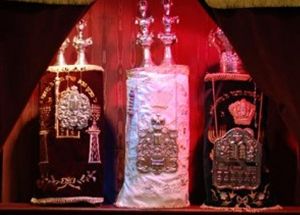
Kol Nidre & Yom Kippur
- Kol Nidre Service - Sunday, September 20 at 7:30 pm
- Yom Kippur Service - Monday, September 21 at 11:00 am
- Yizkor Service - Monday, September 21 at 2:00 pm
- Prayer & Worship - Monday, September 21 at 2:15 pm
- Neilah Service - Monday, September 21 at 6:30 pm
- Break-the-Fast - Monday, September 21 at 7:30 pm
Yom Kippur is the Day of Atonement and is considered the most solemn of all the Jewish holy days. This was the one day each year when the High Priest would enter the Holy of Holies to make atonement for all the Israelites. In Leviticus 16, Scripture contains the details of the ceremony in which two goats were sacrificed – one killed as a blood sacrifice and one as a scapegoat, symbolically removing the sins of the people from the camp. This is how G-d allowed the Jewish people to receive atonement for their sins, following their days of repentance. In Leviticus 23:26-32, G-d commanded that the Israelites set this day apart from all others forever, no matter where they might live. We fast from sundown on the ninth of Tishri until sundown on the tenth of Tishri and spend that time humbling ourselves before G-d. Jewish people all over the world pray that their names will be written in the Book of Life for another year and hope for a sweet year as they end the fast with a joyous meal together. As Messianic Jews, we have full joy and confidence, believing that Yeshua became the sacrifice that G-d required to make atonement for our sins.
NO TICKETS ARE REQUIRED!
NO TICKETS ARE REQUIRED!

Sukkot
Friday, September 25 - Saturday, September 26
Service - Friday, September 25 at 8:00 pm
Service - Friday, September 25 at 8:00 pm
Sukkot (booths) is also known as the Feast of Tabernacles. Leviticus 23:33-44 shows that it was a harvest holiday to bring in the latter harvest. It was a time for Israelites to remember that G-d dwelled with them during the 40-year wilderness period while living in temporary booths. We celebrate Sukkot by building, decorating, and dwelling (to varying degrees) in a sukkah (shelter) in our yards and synagogues for a week. We wave in all four directions, the “Four Species,” made up of the lulav (palm branch), the etrog (citrus fruit from Israel), the hadas (myrtle), and the arava (willow), focusing on the fact that G-d is omnipresent. It was a time of joy in the hope for winter rains to come and was prophetically demonstrating the joy that would come when the living waters of the Ruach HaKodesh (Holy Spirit) would be poured out on all Israel. As Messianic Jews, we are anticipating with great joy the day when the Kingdom of G-d will come to the redeemed earth and G-d will dwell with His people in all His glory!
All are welcome at our annual Sukkot service! Our beautiful sukkah will be up and decorated all week so plan to come early or stay for a while following the service to spend time in it.
All are welcome at our annual Sukkot service! Our beautiful sukkah will be up and decorated all week so plan to come early or stay for a while following the service to spend time in it.
We will also have our Beth Hallel Sukkot Family Picnic in the park for our Beth Hallel families to enjoy each other’s company with food, music, games, crafts, softball, face painting and of course, a sukkah!
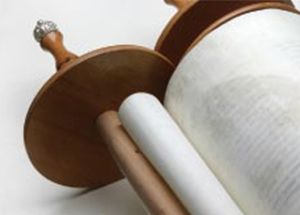
Shemini Atzeret & Simchat Torah
Friday, October 2 - Saturday, October 3
Service - Friday, October 2 at 8:00pm
Service - Friday, October 2 at 8:00pm
Shemini Atzeret means the Eighth Day of Assembly and refers to the closing of Sukkot. As we read in Leviticus 23:36, Shemini Atzeret is a Shabbat and a day for a holy convocation. Simchat Torah (Rejoicing in the Law) is the day corresponding to Shemini Atzeret. Every year, the entire Torah is completed by reading one portion each week during synagogue services. Simchat Torah is the day when the final chapters of Deuteronomy and the first chapters of Genesis are read, completing and restarting the annual cycle. We celebrate the gift of the Torah with music and dance and take great delight in the goodness of G-d’s perfect Word.
Congregation Beth Hallel's Simchat Torah service is usually our most joyous Torah service of the entire year. We will process around the congregation, literally following G-d’s Word and waving Israeli flags, while the Torah is rolled all the way back to Genesis 1:1 in preparation to read it yet again. All are welcome!
Congregation Beth Hallel's Simchat Torah service is usually our most joyous Torah service of the entire year. We will process around the congregation, literally following G-d’s Word and waving Israeli flags, while the Torah is rolled all the way back to Genesis 1:1 in preparation to read it yet again. All are welcome!
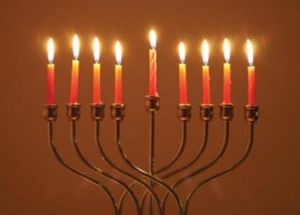
Hanukkah
Friday, December 4 - Saturday, December 12
Hanukkah Party - Sunday, December 6 at 5:00 pm
Hanukkah Party - Sunday, December 6 at 5:00 pm
Hanukkah (dedication) is the Feast of Dedication and commonly referred to as the Festival of Lights. It is an eight-day celebration recalling a time of great oppression for the Jewish people under the reign of Antiochus IV, who desecrated the Temple and prohibited Jewish people from practicing Judaism. The defeat of this leader and his people was accomplished by a revolt led by Mattathias the Hasmonean and his son Judah Maccabee.
The Maccabees and their followers took on the heavy task of restoring the Temple. The menorah in the Temple was supposed to burn continually, but was found with only enough oil to last for one day. It would take eight days for more oil to be prepared, but they decided to light it anyway. Miraculously, according to tradition, the tiny bit of oil lasted all eight days until the new oil was ready. The eight-day festival of Hanukkah was established to celebrate the rededication of the Temple. We commemorate these events by lighting candles in a Hanukkiah (menorah with nine branches – eight for the eight day miracle and an extra called the shammash (servant) to light the others) and by eating foods cooked in oil such as latkes (potato pancakes) and sufganiot (Israeli doughnuts).
We also play with dreidels (spinning tops) to remember how the Jewish children covered up the fact that they were studying Torah when soldiers came by. This holiday is prophesied about in the book of Daniel (chapter 8) and very special because we know that Yeshua celebrated it in the same Temple that the Maccabees rededicated (John 10:22).
For Beth Hallel's annual Hanukkah party there will be food, music, activities for children, dreidels, latkes, gelt, lots of chanukkiyot and more! All are welcome!
The Maccabees and their followers took on the heavy task of restoring the Temple. The menorah in the Temple was supposed to burn continually, but was found with only enough oil to last for one day. It would take eight days for more oil to be prepared, but they decided to light it anyway. Miraculously, according to tradition, the tiny bit of oil lasted all eight days until the new oil was ready. The eight-day festival of Hanukkah was established to celebrate the rededication of the Temple. We commemorate these events by lighting candles in a Hanukkiah (menorah with nine branches – eight for the eight day miracle and an extra called the shammash (servant) to light the others) and by eating foods cooked in oil such as latkes (potato pancakes) and sufganiot (Israeli doughnuts).
We also play with dreidels (spinning tops) to remember how the Jewish children covered up the fact that they were studying Torah when soldiers came by. This holiday is prophesied about in the book of Daniel (chapter 8) and very special because we know that Yeshua celebrated it in the same Temple that the Maccabees rededicated (John 10:22).
For Beth Hallel's annual Hanukkah party there will be food, music, activities for children, dreidels, latkes, gelt, lots of chanukkiyot and more! All are welcome!
